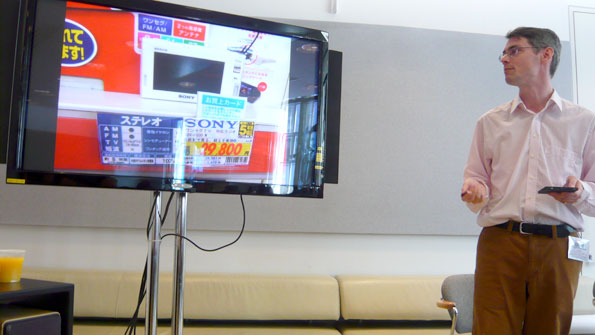A&M Interactive departmental meeting, April 2010

I've written about the staff get-togethers that the Audio & Music Interactive department have before and why I think they work so well. I've picked out a number of things from the meeting earlier this week to share on the blog.
The BBC produces a vast array of content across all genres and the majority of it is consumed at the time of broadcast whether it's Chris Moyles or the Today programme. One of recurring themes that came up again in Tuesday's presentations is how to make more use of this material outside of this window while giving audiences greater control over how they connect and make use of it.
One simple example of this trend that was mentioned and has had excellent feedback from its audience is the archive section of Radio 4's In Our Time where you can find a quite staggering amount of Melvyn.
While the In Our Time archive goes back as far as 1999 (such as this programme with Daniel Liebeskind in an episode on Architecture in the 20th Century) the 5 live election story (pictured above) pulls together recent segments of the station's coverage by day and topic including debates, interviews and audience comments since the start of the current campaign. It's a logical progression to the department's work on "chapterising" radio's output and how to package the clipped material in a logical and accessible way. (Read more about chapterisation in this post and the 5 live election story in this one.)
A few other things that came up: Hugh Garry demoed ongoing work about enhancing music charts by drawing on additional datasets. While the top forty single listing style hasn't really changed since inception (and what else would you want but a list?) there are lots of cool interactive graphic representations that can be made in additon, how singles are performing over a period of time for example, that reflect the taste and interests of the chart's core audience as well as ways of sharing it with friends. I can't show any of the pictures of this but Hugh will be blogging about this in the next few weeks on the Chart blog.
There was talk about the visualisation work around some radio output that's been going on such as the weekly sports challenge on Chris Evans's show or this video of Gary Numan and Little Boots from last year's 6 Music session.
Also thanks to Dharmesh Rajput from the Asian Network team I now have a much better knowledge (and desire to find out more) about not only Bollywood cinema but also its huge global fan base. You can find out more about Bollywood here and get the Bollywood Player for your own site here.

To round things off James Cridland (above), previously of this parish, talked about his recent tour of radio stations around the world and their forays into digital media, mobile, metadata and much more. James has written most of it up on his blog so rather than paraphrase what he's learnt I'll direct you there.
Elsewhere in the building while James's talk was going on Jem Stone chatted to Tracy Morter and Jon Morter, the people who brought you the Christmas Rage Against the Machine for number 1 campaign, about how they used social media to help achieve their aim. By all accounts it was an insightful session into what you can do with little budget but lots of motivation.
Paul Murphy is the Editor of the BBC Internet blog.










